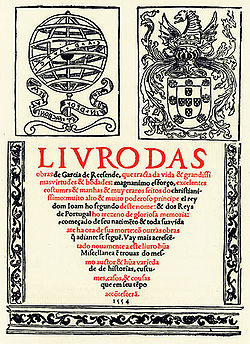
Garcia de Resende
Encyclopedia

Portugal
Portugal , officially the Portuguese Republic is a country situated in southwestern Europe on the Iberian Peninsula. Portugal is the westernmost country of Europe, and is bordered by the Atlantic Ocean to the West and South and by Spain to the North and East. The Atlantic archipelagos of the...
poet and editor. He served John II
John II of Portugal
John II , the Perfect Prince , was the thirteenth king of Portugal and the Algarves...
as a page and private secretary, and later became a knight
Knight
A knight was a member of a class of lower nobility in the High Middle Ages.By the Late Middle Ages, the rank had become associated with the ideals of chivalry, a code of conduct for the perfect courtly Christian warrior....
in the Order of Christ
Order of Christ
Order of Christ may refer to:* Order of Christ – former Knights Templar Order awarded initially by the kings of Portugal, now by the Portuguese state...
. Resende built a chapel
Chapel
A chapel is a building used by Christians as a place of fellowship and worship. It may be part of a larger structure or complex, such as a church, college, hospital, palace, prison or funeral home, located on board a military or commercial ship, or it may be an entirely free-standing building,...
in the monastery
Monastery
Monastery denotes the building, or complex of buildings, that houses a room reserved for prayer as well as the domestic quarters and workplace of monastics, whether monks or nuns, and whether living in community or alone .Monasteries may vary greatly in size – a small dwelling accommodating only...
of Espinheiro near Évora
Évora
Évora is a municipality in Portugal. It has total area of with a population of 55,619 inhabitants. It is the seat of the Évora District and capital of the Alentejo region. The municipality is composed of 19 civil parishes, and is located in Évora District....
, the pantheon of the Alemtejo nobility
Nobility
Nobility is a social class which possesses more acknowledged privileges or eminence than members of most other classes in a society, membership therein typically being hereditary. The privileges associated with nobility may constitute substantial advantages over or relative to non-nobles, or may be...
, where he was buried.
He compiled the Cancioneiro Geral (General Songbook), probably starting in 1483, though not printed until 1516, which includes the compositions of some three hundred fidalgos of the reigns of kings Alphonso V
Afonso V of Portugal
Afonso V KG , called the African , was the twelfth King of Portugal and the Algarves. His sobriquet refers to his conquests in Northern Africa.-Early life:...
, John II, and Manoel.
The main subjects of its pieces are love, satire
Satire
Satire is primarily a literary genre or form, although in practice it can also be found in the graphic and performing arts. In satire, vices, follies, abuses, and shortcomings are held up to ridicule, ideally with the intent of shaming individuals, and society itself, into improvement...
and epigram
Epigram
An epigram is a brief, interesting, usually memorable and sometimes surprising statement. Derived from the epigramma "inscription" from ἐπιγράφειν epigraphein "to write on inscribe", this literary device has been employed for over two millennia....
; and most of them are written in the national redondilha verse
Verse (poetry)
A verse is formally a single line in a metrical composition, e.g. poetry. However, the word has come to represent any division or grouping of words in such a composition, which traditionally had been referred to as a stanza....
, but the metre
Meter (poetry)
In poetry, metre is the basic rhythmic structure of a verse or lines in verse. Many traditional verse forms prescribe a specific verse metre, or a certain set of metres alternating in a particular order. The study of metres and forms of versification is known as prosody...
is irregular and the rhyming careless. The Spanish language is largely employed, because the literary progenitors of the whole collection were Juan de Mena
Juan de Mena
Juan de Mena was one of the most significant Spanish poets of the fifteenth century. He was highly regarded at the court of Juan II de Castilla, who appointed him veinticuatro of Córdoba, secretario de cartas latinas and cronista real...
, Jorge Manrique
Jorge Manrique
Jorge Manrique was a major Spanish poet, whose main work, the Coplas a la muerte de su padre , is still read today...
, Boscan and Garcilasso. As a rule the compositions were improvised at palace entertainments, at which the poets present divided into two bands, attacking and defending a given theme throughout successive evenings.

